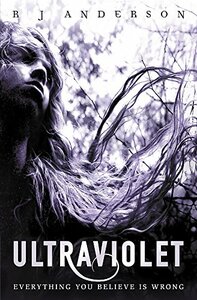Take a photo of a barcode or cover
This was kinda bad. The writing was meh. The voice left me cold. Alison was so fearful for herself without looking outward at all. Sure, her mother screwed her up, and there was potential for something there, but it wasn't realized.
Spoiler
Also, I'm not buying that "Infinity" chapter because I utterly reject the crazy or maybe-crazy person as unreliable narrator. Just no. Enough, already. (Also, also, I looked at the synopsis of the sequel, so nope.)
Once upon a time there was a girl who was special.
This is not her story
Unless you count the part where I killed her.
5* blurb!
5* cover photo!
& the book was heading towards 5* content - & I don't read paranormal & rarely read sci-fi or YA! This story was so engrossing that I just about couldn't put it down. But just towards the end it started to do too much telling rather than showing, which just slowed the pace down.
Still a 4.5* read for me & I'm going to try to get hold of the sequel. Quicksilver.
This is not her story
Unless you count the part where I killed her.
5* blurb!
5* cover photo!
& the book was heading towards 5* content - & I don't read paranormal & rarely read sci-fi or YA! This story was so engrossing that I just about couldn't put it down. But just towards the end it started to do too much telling rather than showing, which just slowed the pace down.
Still a 4.5* read for me & I'm going to try to get hold of the sequel. Quicksilver.
Not gonna lie, initially I was planning to give this book a bad review. It seemed really typical YA and the characters were bland to start with but it honestly did an amazing job at character building in the second half and it went in a completely different direction than I expected. The writing ties in neatly together at the end and I got genuinely emotional about Alison's realisation that she's sane.
While it is very annoying to hear, please give this book atleast the first 250 pages before giving up. It is worth it in the end.
The synesthesia aspect of it truly does sound very awkward at first but by the end you get used to it and it sounds natural I swear.
Having said that I'm still a tiny bit let down because this book isn't what I expected it to be from the way it was marketed. I was expecting a better written version of Mara Dyer but this is competely different.
While it is very annoying to hear, please give this book atleast the first 250 pages before giving up. It is worth it in the end.
The synesthesia aspect of it truly does sound very awkward at first but by the end you get used to it and it sounds natural I swear.
Having said that I'm still a tiny bit let down because this book isn't what I expected it to be from the way it was marketed. I was expecting a better written version of Mara Dyer but this is competely different.
I read this in one sitting. Good, fast-paced, and dodges all the cliche tropes with the teen-accused-of-murder sub genre. I’ll admit I’m not entirely sold on the end, and apparently there will be a sequel, but still a great read.
The Short and Sweet of It (from publisher)
Once upon a time there was a girl who was special.
This is not her story.
Unless you count the part where I killed her.
Sixteen-year-old Alison has been sectioned in a mental institute for teens, having murdered the most perfect and popular girl at school. But the case is a mystery: no body has been found, and Alison's condition is proving difficult to diagnose. Alison herself can't explain what happened: one minute she was fighting with Tori -- the next she disintegrated. Into nothing. But that's impossible. Right?
My Thoughts
As a character, Alison is sympathetic. She suffers from synesthesia (and I mean, she actually suffers; I'm not using that indelicately in the way many do to refer to any sort of mental difference), meaning numbers have colors and words have tastes and sounds have visible form. Obviously, this ability takes a central role in the plot line, but more importantly (to me), it gave the author the opportunity to write description in a completely unique way. I enjoyed sensing the world through Alison's ability, and really you could read the book just for that experience and be satisfied.
The other characters in the novel also felt unique, and I enjoyed the clear presentation of personality and the subsequent realistic actions the characters take. Anderson populated Alison's world with well-developed characters from Dr. Minta, with his complex combination of curiosity and compassion, to Sanjay's never explained but entirely compelling insight.
The pacing threw me a bit after I finished reading. The majority of the plot reads like realistic fiction with any inconsistencies explained by the mental state of our narrator, but towards the end, the story shifts becoming science fiction. Honestly, I would have preferred the story remained realistic fiction. Saying any more would be really spoilerific so I'll stop there.
Despite the genre shift, I recommend Ultraviolet to any who enjoy YA SFF, especially if you like your SFF on the lighter side. I read the whole book in two sittings, not wanting to put it down.
Once upon a time there was a girl who was special.
This is not her story.
Unless you count the part where I killed her.
Sixteen-year-old Alison has been sectioned in a mental institute for teens, having murdered the most perfect and popular girl at school. But the case is a mystery: no body has been found, and Alison's condition is proving difficult to diagnose. Alison herself can't explain what happened: one minute she was fighting with Tori -- the next she disintegrated. Into nothing. But that's impossible. Right?
My Thoughts
As a character, Alison is sympathetic. She suffers from synesthesia (and I mean, she actually suffers; I'm not using that indelicately in the way many do to refer to any sort of mental difference), meaning numbers have colors and words have tastes and sounds have visible form. Obviously, this ability takes a central role in the plot line, but more importantly (to me), it gave the author the opportunity to write description in a completely unique way. I enjoyed sensing the world through Alison's ability, and really you could read the book just for that experience and be satisfied.
The other characters in the novel also felt unique, and I enjoyed the clear presentation of personality and the subsequent realistic actions the characters take. Anderson populated Alison's world with well-developed characters from Dr. Minta, with his complex combination of curiosity and compassion, to Sanjay's never explained but entirely compelling insight.
The pacing threw me a bit after I finished reading. The majority of the plot reads like realistic fiction with any inconsistencies explained by the mental state of our narrator, but towards the end, the story shifts becoming science fiction. Honestly, I would have preferred the story remained realistic fiction. Saying any more would be really spoilerific so I'll stop there.
Despite the genre shift, I recommend Ultraviolet to any who enjoy YA SFF, especially if you like your SFF on the lighter side. I read the whole book in two sittings, not wanting to put it down.
This book was interesting at first but the ending to me was just plain stupid. I didn't particularly liked the alien thing. I am not reading the second book because I could barely get through the first. On to the next
What a trainwreck. I couldn't wait for this book to be over. It was that bad.
Despite her "abilities", the heroine is so bland and such a Mary Sue. Her thoughts feel so stupid and the story doesn't make any sense.
Despite her "abilities", the heroine is so bland and such a Mary Sue. Her thoughts feel so stupid and the story doesn't make any sense.
Ridiculous plot. Not as good as I was expecting. I had to wait MUCH too long for the story to start. Rushed ending.




